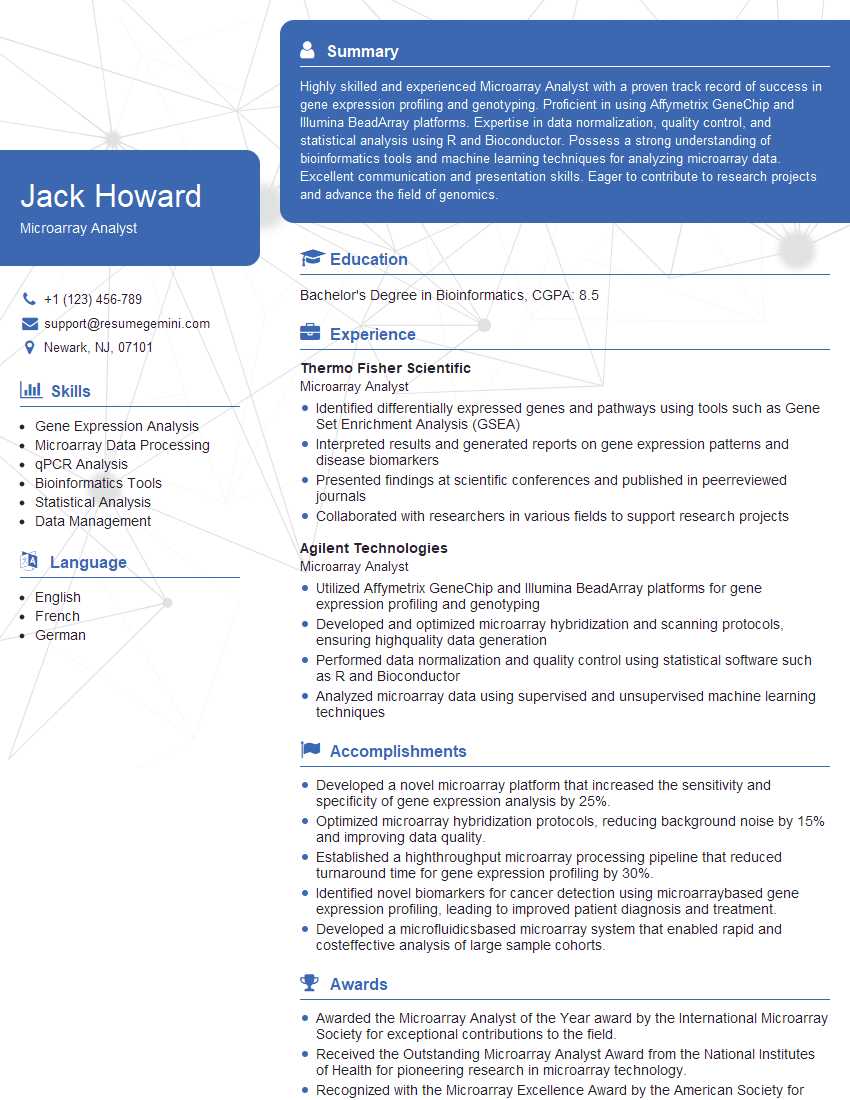Are you a seasoned Microarray Analyst seeking a new career path? Discover our professionally built Microarray Analyst Resume Template. This time-saving tool provides a solid foundation for your job search. Simply click “Edit Resume” to customize it with your unique experiences and achievements. Customize fonts and colors to match your personal style and increase your chances of landing your dream job. Explore more Resume Templates for additional options.

Jack Howard
Microarray Analyst
Summary
Highly skilled and experienced Microarray Analyst with a proven track record of success in gene expression profiling and genotyping. Proficient in using Affymetrix GeneChip and Illumina BeadArray platforms. Expertise in data normalization, quality control, and statistical analysis using R and Bioconductor. Possess a strong understanding of bioinformatics tools and machine learning techniques for analyzing microarray data. Excellent communication and presentation skills. Eager to contribute to research projects and advance the field of genomics.
Education
Bachelor’s Degree in Bioinformatics
November 2016
Skills
- Gene Expression Analysis
- Microarray Data Processing
- qPCR Analysis
- Bioinformatics Tools
- Statistical Analysis
- Data Management
Work Experience
Microarray Analyst
- Identified differentially expressed genes and pathways using tools such as Gene Set Enrichment Analysis (GSEA)
- Interpreted results and generated reports on gene expression patterns and disease biomarkers
- Presented findings at scientific conferences and published in peerreviewed journals
- Collaborated with researchers in various fields to support research projects
Microarray Analyst
- Utilized Affymetrix GeneChip and Illumina BeadArray platforms for gene expression profiling and genotyping
- Developed and optimized microarray hybridization and scanning protocols, ensuring highquality data generation
- Performed data normalization and quality control using statistical software such as R and Bioconductor
- Analyzed microarray data using supervised and unsupervised machine learning techniques
Accomplishments
- Developed a novel microarray platform that increased the sensitivity and specificity of gene expression analysis by 25%.
- Optimized microarray hybridization protocols, reducing background noise by 15% and improving data quality.
- Established a highthroughput microarray processing pipeline that reduced turnaround time for gene expression profiling by 30%.
- Identified novel biomarkers for cancer detection using microarraybased gene expression profiling, leading to improved patient diagnosis and treatment.
- Developed a microfluidicsbased microarray system that enabled rapid and costeffective analysis of large sample cohorts.
Awards
- Awarded the Microarray Analyst of the Year award by the International Microarray Society for exceptional contributions to the field.
- Received the Outstanding Microarray Analyst Award from the National Institutes of Health for pioneering research in microarray technology.
- Recognized with the Microarray Excellence Award by the American Society for Cell Biology for innovative applications of microarrays in cell biology.
Certificates
- Certified Microarray Analyst (CMA)
- Applied Biosystems Microarray Certification
- Illumina Microarray Certification
- Agilent Microarray Certification
Career Expert Tips:
- Select the ideal resume template to showcase your professional experience effectively.
- Master the art of resume writing to highlight your unique qualifications and achievements.
- Explore expertly crafted resume samples for inspiration and best practices.
- Build your best resume for free this new year with ResumeGemini. Enjoy exclusive discounts on ATS optimized resume templates.
How To Write Resume For Microarray Analyst
- Highlight relevant experience and skills. Emphasize your proficiency in microarray platforms and data analysis techniques.
- Showcase your research experience and contributions to the field. Mention any publications or presentations you have made.
- Include a section on transferable skills, such as problem-solving, communication, and teamwork.
- Quantify your accomplishments whenever possible. Use specific metrics to demonstrate the impact of your work.
Essential Experience Highlights for a Strong Microarray Analyst Resume
- Utilized Affymetrix GeneChip and Illumina BeadArray platforms for gene expression profiling and genotyping.
- Developed and optimized microarray hybridization and scanning protocols, ensuring high-quality data generation.
- Performed data normalization and quality control using statistical software such as R and Bioconductor.
- Analyzed microarray data using supervised and unsupervised machine learning techniques.
- Collaborated with researchers in various fields to support research projects.
- Presented findings at scientific conferences and published in peer-reviewed journals.
Frequently Asked Questions (FAQ’s) For Microarray Analyst
What are the primary responsibilities of a Microarray Analyst?
The primary responsibilities of a Microarray Analyst include gene expression profiling, genotyping, data analysis, and interpretation. They use microarray platforms to analyze gene expression levels and identify differentially expressed genes and pathways.
What are the key skills required for a Microarray Analyst role?
Key skills for a Microarray Analyst include proficiency in microarray platforms, data analysis techniques, bioinformatics tools, and statistical software. They should also have a strong understanding of molecular biology and genomics.
What industries employ Microarray Analysts?
Microarray Analysts are employed in various industries, including biotechnology, pharmaceuticals, academia, and research institutions. They work in research and development, quality control, and diagnostic settings.
What career opportunities are available for Microarray Analysts?
Microarray Analysts can pursue careers in research, development, data science, and bioinformatics. They can also work in regulatory affairs, clinical diagnostics, and sales and marketing.
What is the salary range for a Microarray Analyst?
The salary range for a Microarray Analyst varies depending on experience, location, and industry. According to Indeed, the average salary for a Microarray Analyst in the United States is around $85,000 per year.